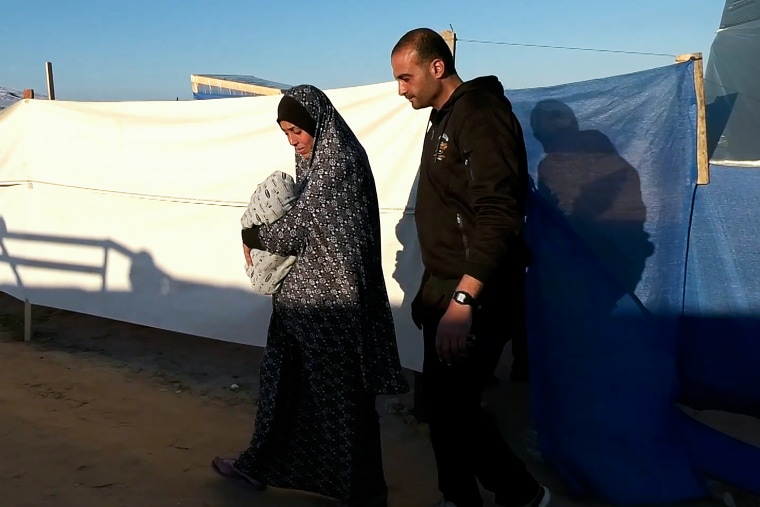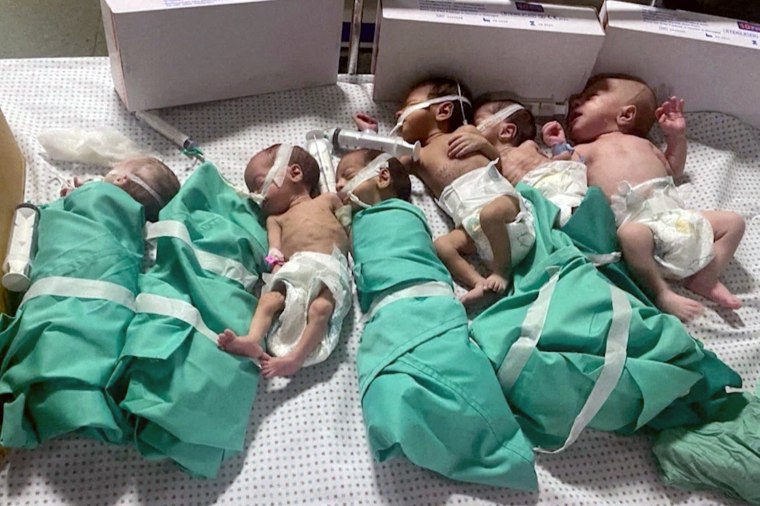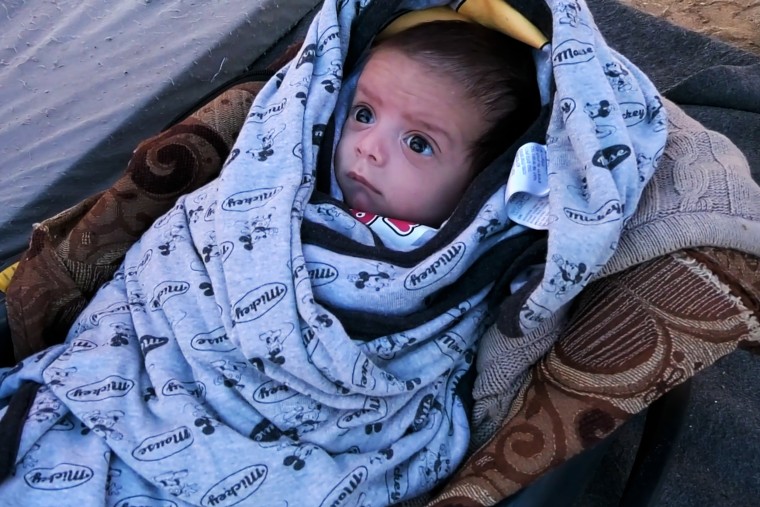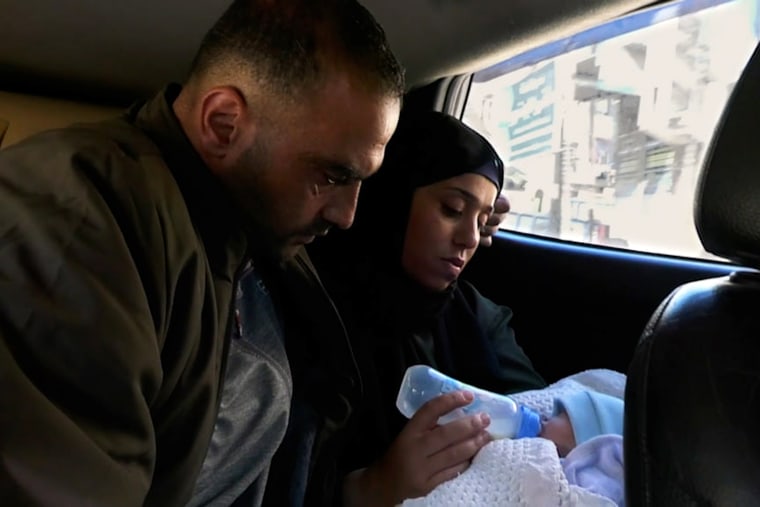CAIRO, Egypt — Bundled up in layers of blankets at a tent encampment in Gaza’s southern city of Rafah, baby Anas Stateh cries out in pain. For weeks, the five-month-old has suffered from a hernia that requires urgent surgery, but the war has made it impossible for his parents to get him the help he needs.
“The boy is weak,” his father, Jalal Stateh, told NBC News’ crew in Rafah, where more than 1 million people have taken refuge last week amid Israel’s offensive in the enclave. Baby Anas, he said, gets “no sleep, day or night.”
“I am watching him … losing him,” Jalal Stateh added.
Anas has already survived plenty. In November, he was one of 31 babies evacuated from Al-Shifa Hospital in northern Gaza as part of a high-stakes mission led by the World Health Organization.

Once considered the backbone of Gaza’s health care system, the complex was raided by the Israel Defense Forces, with the IDF alleging the hospital was being used as a command center for Hamas — an allegation supported by U.S. intelligence, according to a U.S. official. In November, Israel released footage it said showed hostages being forced onto the premises of Al-Shifa Hospital, as well as video purported to show a tunnel under the facility.
Before evacuating the complex, and already cut off from food, water and fuel for electricity, doctors were forced to move the babies from their incubators to a temperature-controlled operating room.
Dr. Ahmed El Mokhallallati, the director of Al-Shifa’s burns unit, recalled how he risked his life climbing up to the hospital’s rooftop, which he said was surrounded by snipers, to a get strong enough signal to send photos of the babies out to the world, in hopes that the international community might intervene. In the photos, which he shared at the time with NBC News, babies could be seen lying side by side with tape and tubes attached to their faces.

“[I was] hearing gunshots hitting the wall beside [me],” he said. He added that many of the babies were conceived via in vitro fertilization, or IVF therapy, with families spending thousands of dollars to have them.
“A lot of efforts have been spent to get these babies to their lives … we were about to lose their lives just because we were unable to have incubators. We were unable to get electricity,” El Mokhallallati said.
Despite efforts to save them, six babies died during the Israeli military’s siege and subsequent raid of Al-Shifa Hospital, according to doctors. Those who survived were rushed south, first to the El Emirati Hospital in Rafah, and then to two other hospitals in Egypt, including the New Administrative Capital Hospital outside Cairo.
Because only mothers were allowed to accompany the babies across the border, Anas’ parents were forced to make an impossible choice — either keep Anas with them in Gaza to keep the family together or send him alone to Egypt where he’d be safer. They chose to keep him in Gaza.
Most of the other babies were sent to Egypt for care.
“We received the babies without any data from them,” Dr. Mohamed Abu Sekkine, who is charged with the babies’ care at the New Administrative Capital Hospital said in late November. “They brought them for us with very bad general condition,” he said, adding that those still at the hospital are now “more or less stable.”

Most of the babies arrived at the hospital unaccompanied, with the whereabouts of their families unknown. Some babies have since been reunited with their parents, including two sets of twins, while the families of others have yet to be found. As of Thursday, nine babies remained in the nursery without their mothers.
One baby, known only as “Halema,” believed to be his mother’s name, is among them. He lost an eye in Gaza and had a rare bacterial infection when he arrived at the Egyptian hospital. He’s now out of the NICU and recovering well, but his loved ones are believed to have died, with no one coming forward to claim him.
Egyptian and Palestinian authorities have said they are determined to track down the families of the babies who have yet to be claimed — assuming they have survived Israel’s offensive, which has so far seen more than 29,000 people killed in Gaza, with more than two-thirds being women and children.
Israel launched its campaign in Gaza after Hamas’ Oct. 7 attacks, in which some 1,200 people were killed and around 240 others were taken hostage by Hamas.
Nour Al Banna is the only mother who has been able to reconnect with her 5-month-old twin daughters, Layan and Leena, before they crossed the border into Egypt for urgent medical care.
“I knew they were besieged, no food, no water, no medicine. I was really afraid of losing them,” she told NBC News in November. “I kept on crying when I found them alive. I wanted to know how their health was. The doctor in the other hospital told me he was surprised how they survived.”
In Rafah, Anas’ family is struggling to survive.
They have already had to relocate from a shelter in Khan Younis due to bombing —and with Israeli forces planning a ground offensive in Rafah, they are worried they’ll need to move once again.

Jalal Stateh and his wife, Wardeh Stateh, have tried taking their son to several hospitals across southern Gaza to get his hernia treated, but each time they’ve been turned away, with the few medical facilities still running already packed with patients in need of urgent care.
Israel has warned that if Hamas does not return all hostages by the start of Ramadan, which begins the evening of March 10, its forces will launch their ground assault on Rafah, which Israel once declared a safe zone.
“I am afraid to move,” Jalal Stateh says. “[What if] I can’t find food or milk for Anas? The area where people are heading, El Wasta, for sure, it has no milk. Water is hard to get. There is no electricity, things are tough.”
The father said he regrets the decision not to send Anas to Egypt where he’d have access to the medical care he needs to survive. But at the time, he had no way of knowing Anas would need surgery.
“His health is deteriorating,” he said. “I am so worried about him, that I will lose him if we don’t save him … I want the war to stop, and I want God to honor Anas and perform the surgery so that Anas can live like his siblings and live in peace like the rest of the world’s children.”
Erin McLaughlin and Charlene Gubash reported from Cairo, and Chantal Da Silva from Tel Aviv.






